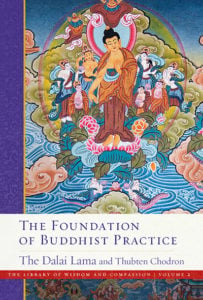
The Library of Wisdom and Compassion
A special multivolume series by His Holiness the Dalai Lama and Venerable Thubten Chodron
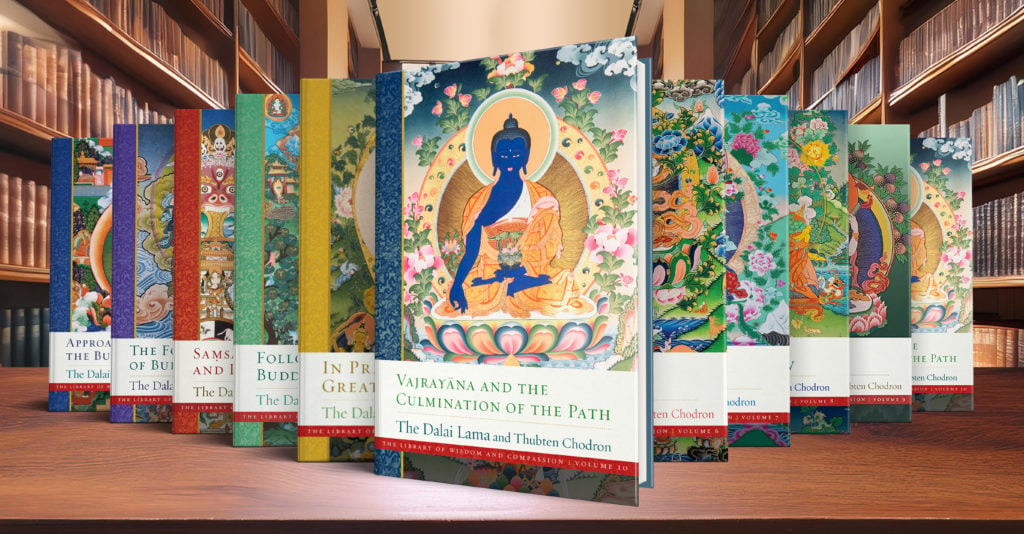
The Library of Wisdom and Compassion is a special multivolume series in which His Holiness the Dalai Lama shares the Buddha’s teachings on the complete path to full awakening that he himself has practiced his entire life. The topics are arranged especially for people seeking practical spiritual advice and are peppered with the Dalai Lama’s own unique outlook. Assisted by his long-term disciple, the American nun Thubten Chodron, the Dalai Lama sets the context for practicing the Buddha’s teachings in modern times and then unveils the path of wisdom and compassion that leads to a meaningful life and sense of personal fulfillment. This series is an important bridge from introductory to profound topics for those seeking an in-depth explanation from a contemporary perspective.
“I wanted to express my deep heartfelt gratitude to His Holiness the Dalai Lama and Venerable Thubten Chodron and all the Sravasti Abbey Monastics who have supported them to produce this amazing series of books. I have always wanted to delve deeply into many Buddhist subjects but simply found a lot of the traditional Buddhist books very difficult to read or comprehend. Thank you to the Library of Wisdom and Compassion. It has provided an important bridge so that I can begin to understand these subjects better and then use it as a stepping stone to access more traditional texts and books. Thank you, thank you, thank you!” —a student in Australia
All ten volumes are now available below through Wisdom Publications.
Meet the Authors
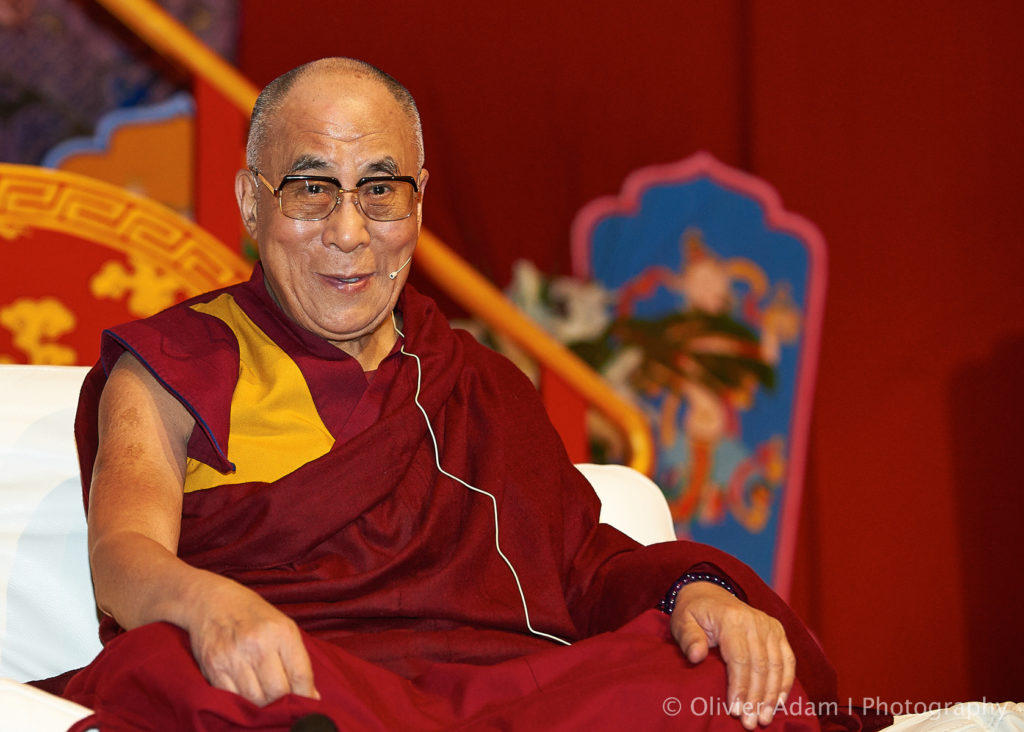 Tenzin Gyatso, the Fourteenth Dalai Lama, is the spiritual leader of the Tibetan people. He frequently describes himself as a simple Buddhist monk. Born in northeastern Tibet in 1935, he was as a toddler recognized as the incarnation of the Thirteenth Dalai Lama and brought to Tibet’s capital, Lhasa. In 1950, Mao Zedong’s Communist forces made their first incursions into eastern Tibet, shortly after which the young Dalai Lama assumed the political leadership of his country. He passed his scholastic examinations with honors at the Great Prayer Festival in Lhasa in 1959, the same year Chinese forces occupied the city, forcing His Holiness to escape to India. There he set up the Tibetan government-in-exile in Dharamsala, working to secure the welfare of the more than 100,000 Tibetan exiles and prevent the destruction of Tibetan culture. In his capacity as a spiritual and political leader, he has traveled to more than sixty-two countries on six continents and met with presidents, popes, and leading scientists to foster dialogue and create a better world. In recognition of his tireless work for the nonviolent liberation of Tibet, the Dalai Lama was awarded the Nobel Peace Prize in 1989. In 2012, he relinquished political authority in his exile government and turned it over to democratically elected representatives.
Tenzin Gyatso, the Fourteenth Dalai Lama, is the spiritual leader of the Tibetan people. He frequently describes himself as a simple Buddhist monk. Born in northeastern Tibet in 1935, he was as a toddler recognized as the incarnation of the Thirteenth Dalai Lama and brought to Tibet’s capital, Lhasa. In 1950, Mao Zedong’s Communist forces made their first incursions into eastern Tibet, shortly after which the young Dalai Lama assumed the political leadership of his country. He passed his scholastic examinations with honors at the Great Prayer Festival in Lhasa in 1959, the same year Chinese forces occupied the city, forcing His Holiness to escape to India. There he set up the Tibetan government-in-exile in Dharamsala, working to secure the welfare of the more than 100,000 Tibetan exiles and prevent the destruction of Tibetan culture. In his capacity as a spiritual and political leader, he has traveled to more than sixty-two countries on six continents and met with presidents, popes, and leading scientists to foster dialogue and create a better world. In recognition of his tireless work for the nonviolent liberation of Tibet, the Dalai Lama was awarded the Nobel Peace Prize in 1989. In 2012, he relinquished political authority in his exile government and turned it over to democratically elected representatives.
His Holiness frequently states that his life is guided by three major commitments: the promotion of basic human values or secular ethics in the interest of human happiness, the fostering of interreligious harmony, and securing the welfare of the Tibetan people, focusing on the survival of their identity, culture, and religion. As a superior scholar trained in the classical texts of the Nalanda tradition of Indian Buddhism, he is able to distill the central tenets of Buddhist philosophy in clear and inspiring language, his gift for pedagogy imbued with his infectious joy. Connecting scientists with Buddhist scholars, he helps unite contemplative and modern modes of investigation, bringing ancient tools and insights to bear on the acute problems facing the contemporary world. His efforts to foster dialogue among leaders of the world’s faiths envision a future where people of different beliefs can share the planet in harmony. Wisdom Publications is proud to be the premier publisher of the Dalai Lama’s more serious and in-depth works.
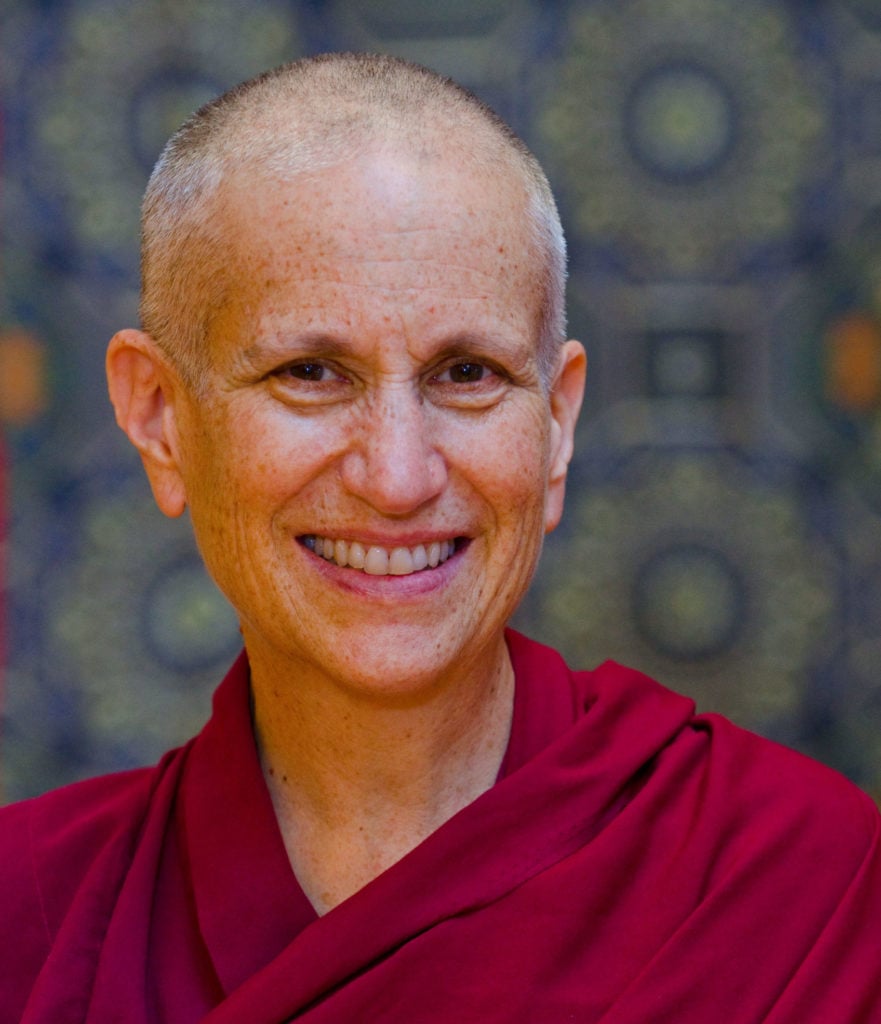
Venerable Thubten Chodron is an author, teacher, and the founder and abbess of Sravasti Abbey, the only Tibetan Buddhist training monastery for Western nuns and monks in the United States. She graduated from UCLA and did graduate work in education at USC. Ordained as a Tibetan Buddhist nun in 1977, she has studied extensively with His Holiness the Dalai Lama, Tsenzhap Serkong Rinpoche, and Kyabje Zopa Rinpoche.
Ven. Chodron teaches worldwide and is known for her practical (and humorous!) explanations of how to apply Buddhist teachings in daily life. She is also involved in prison outreach and interfaith dialogue. She has published many books on Buddhist philosophy and meditation, and has coauthored the book Buddhism: One Teacher, Many Traditions with His Holiness the Dalai Lama. Visit thubtenchodron.org for a media library of her teachings, and sravasti.org to learn more about Sravasti Abbey.
Explore the Series
LATEST RELEASE
Volume 10: Vajrayāna and the Culmination of the Path
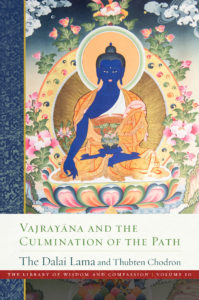 In the final volume of the Library of Wisdom and Compassion His Holiness the Dalai Lama skillfully illuminates the unique qualities and complexities of Vajrayāna, as practiced in Tibet, and illuminates the method to eradicate the subtlest obscurations preventing the full awakening of a buddha. Speaking to newcomers and advanced students alike, he explains the similarities and differences of the Sūtra and Tantra paths, the paths and stages of the four tantric classes, and the generation-stage and completion-stage practices of Highest Yoga Tantra. Readers are also introduced to the practices of clear appearance and divine identity common to all tantric sādhanas, as well as the unique practices of illusory body and actual clear light that overcome the subtlest defilements on the mind and eliminate all obscurations quickly.
In the final volume of the Library of Wisdom and Compassion His Holiness the Dalai Lama skillfully illuminates the unique qualities and complexities of Vajrayāna, as practiced in Tibet, and illuminates the method to eradicate the subtlest obscurations preventing the full awakening of a buddha. Speaking to newcomers and advanced students alike, he explains the similarities and differences of the Sūtra and Tantra paths, the paths and stages of the four tantric classes, and the generation-stage and completion-stage practices of Highest Yoga Tantra. Readers are also introduced to the practices of clear appearance and divine identity common to all tantric sādhanas, as well as the unique practices of illusory body and actual clear light that overcome the subtlest defilements on the mind and eliminate all obscurations quickly.
Volume 1: Approaching the Buddhist Path
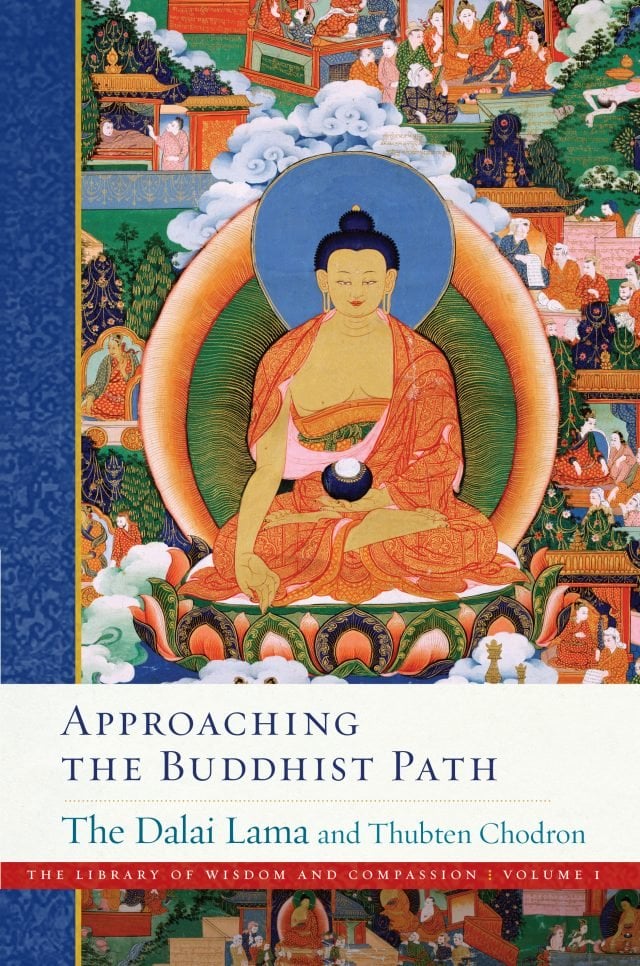 The Buddha wanted his students to investigate, to see for themselves whether what he said was true. As a student of the Buddha, the Dalai Lama promotes the same spirit of investigation, and as the rich tradition of the Buddha makes its way into new lands and cultures, His Holiness has recognized that new approaches are needed to allow seekers in the West to experience the relevance of the liberating message in their own lies. Such an approach cannot assume listeners are free from doubt and already have faith in Buddhism’s basic tenets. The Library of Wisdom and Compassion series, therefore, starts from the universal human wish for happiness, and presents the dynamic nature of the mind. This first volume also provides a wealth of reflections on Buddhist history and fundamentals, contemporary issues, and the Dalai Lama’s own personal experiences.
The Buddha wanted his students to investigate, to see for themselves whether what he said was true. As a student of the Buddha, the Dalai Lama promotes the same spirit of investigation, and as the rich tradition of the Buddha makes its way into new lands and cultures, His Holiness has recognized that new approaches are needed to allow seekers in the West to experience the relevance of the liberating message in their own lies. Such an approach cannot assume listeners are free from doubt and already have faith in Buddhism’s basic tenets. The Library of Wisdom and Compassion series, therefore, starts from the universal human wish for happiness, and presents the dynamic nature of the mind. This first volume also provides a wealth of reflections on Buddhist history and fundamentals, contemporary issues, and the Dalai Lama’s own personal experiences.
Volume 2: The Foundation of Buddhist Practice
The Foundation of Buddhist Practice contains the important teachings that will help us establish a flourishing Dharma practice, beginning with the four seals (impermanence, suffering, selflessness, nirvāṇa) shared by all Buddhist philosophies, and moves on to an explanation of the reliable cognition that allows us to evaluate the veracity of the Buddha’s teachings.
The book provides many other essential Buddhist teachings, including: the relationship of a spiritual mentor and student, clarifying misunderstandings about this topic and showing how to properly rely on a spiritual mentor in a healthy, appropriate, and beneficial manner; how to structure a meditation session; dying and rebirth, unpacking the often difficult-to-understand topic of multiple lives and explaining how to prepare for death and aid someone who is dying; a fruitful explanation of karma and its results; and much more.
His Holiness’s illumination of key Buddhist ideas will support Western and contemporary Asian students in engaging with this rich tradition.
Volume 3: Saṃsāra, Nirvāṇa, and Buddha Nature
Now in paperback!
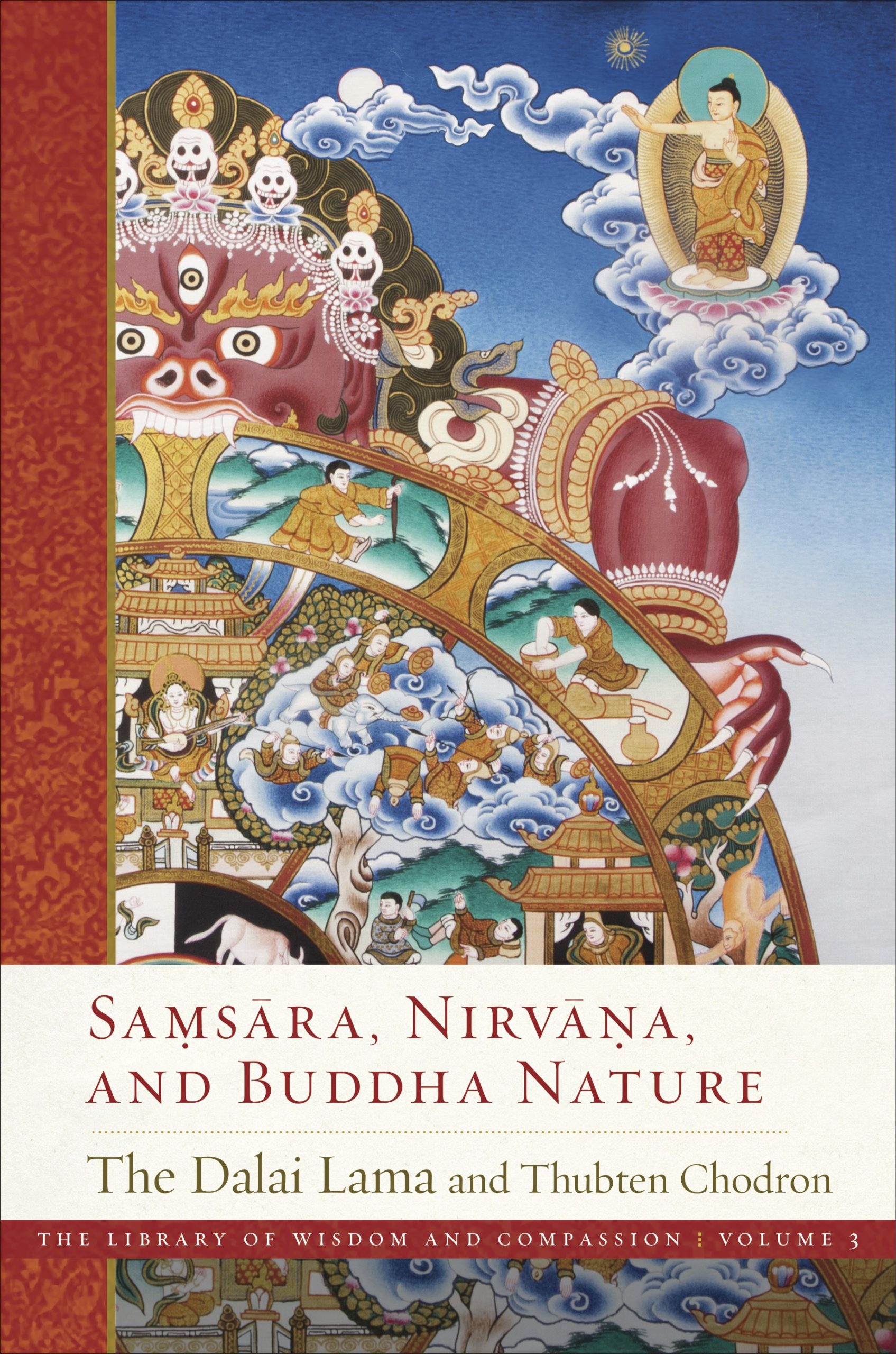 Knowledge of buddha nature reveals and reconciles the paradox of how the mind can be the basis for both the duhkha of samsara (the unpurified mind) and the bliss and fulfillment of nirvāṇa (the purified mind). To illustrate this, Saṃsāra, Nirvāṇa, and Buddha Nature first takes readers through Buddhist thought on the self, the four truths, and their sixteen attributes. It then explains afflictions—including how they arise and their antidotes—followed by an examination of karma and cyclic existence, and, finally, a deep and thorough elucidation of buddha nature. Saṃsāra, Nirvāṇa, and Buddha Nature shows us how to purify our minds and cultivate awakened qualities.
Knowledge of buddha nature reveals and reconciles the paradox of how the mind can be the basis for both the duhkha of samsara (the unpurified mind) and the bliss and fulfillment of nirvāṇa (the purified mind). To illustrate this, Saṃsāra, Nirvāṇa, and Buddha Nature first takes readers through Buddhist thought on the self, the four truths, and their sixteen attributes. It then explains afflictions—including how they arise and their antidotes—followed by an examination of karma and cyclic existence, and, finally, a deep and thorough elucidation of buddha nature. Saṃsāra, Nirvāṇa, and Buddha Nature shows us how to purify our minds and cultivate awakened qualities.
Volume 4: Following in the Buddha’s Footsteps
Now in paperback!
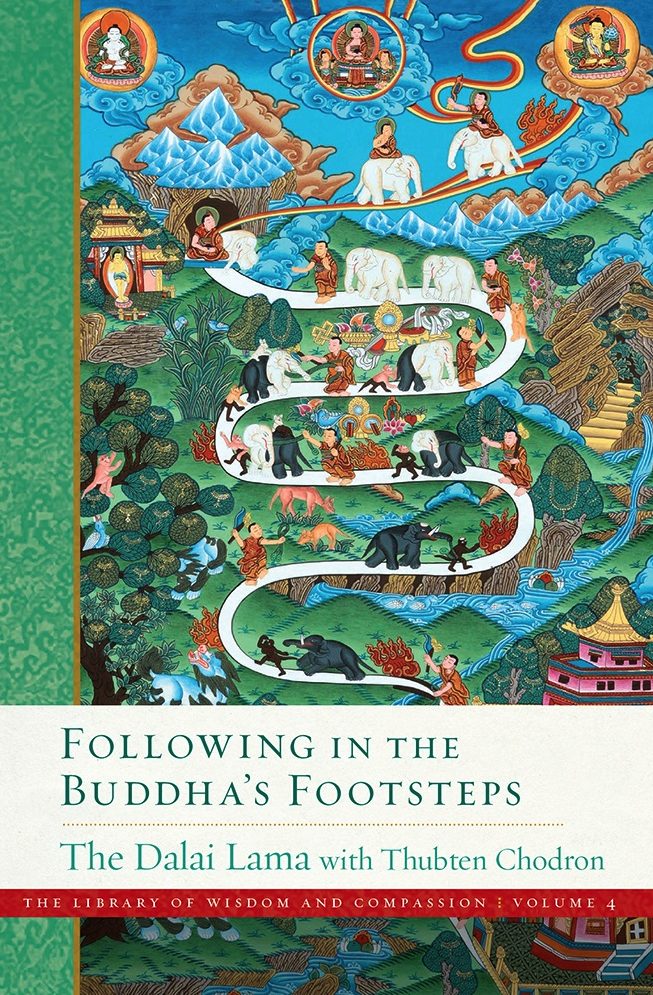 Delve into the substance of spiritual practice in this fourth volume of the Dalai Lama’s definitive series on the path to awakening, Following in the Buddha’s Footsteps. You’ll first hear His Holiness’s explanation of the Buddha, Dharma, and Sangha, why they are reliable guides on the path, and how to relate to them. His Holiness then describes the three essential trainings common to all Buddhist traditions: the higher trainings in ethical conduct, concentration, and wisdom. These chapters show us how to live a life free of harm to self or others and give us detailed instructions on how to develop single-pointed concentration as well as the higher states of concentration available to an earnest practitioner. In addition, the chapters on wisdom contain in-depth teachings on the noble eightfold path and the four establishments of mindfulness for developing greater awareness and understanding of our body, feelings, mind, and other phenomena. Together, these topics form the core of Buddhist practice.
Delve into the substance of spiritual practice in this fourth volume of the Dalai Lama’s definitive series on the path to awakening, Following in the Buddha’s Footsteps. You’ll first hear His Holiness’s explanation of the Buddha, Dharma, and Sangha, why they are reliable guides on the path, and how to relate to them. His Holiness then describes the three essential trainings common to all Buddhist traditions: the higher trainings in ethical conduct, concentration, and wisdom. These chapters show us how to live a life free of harm to self or others and give us detailed instructions on how to develop single-pointed concentration as well as the higher states of concentration available to an earnest practitioner. In addition, the chapters on wisdom contain in-depth teachings on the noble eightfold path and the four establishments of mindfulness for developing greater awareness and understanding of our body, feelings, mind, and other phenomena. Together, these topics form the core of Buddhist practice.
This is a book to treasure and refer to repeatedly as you begin the path, progress on it, and near the final goal of nirvāṇa.
Volume 5: In Praise of Great Compassion
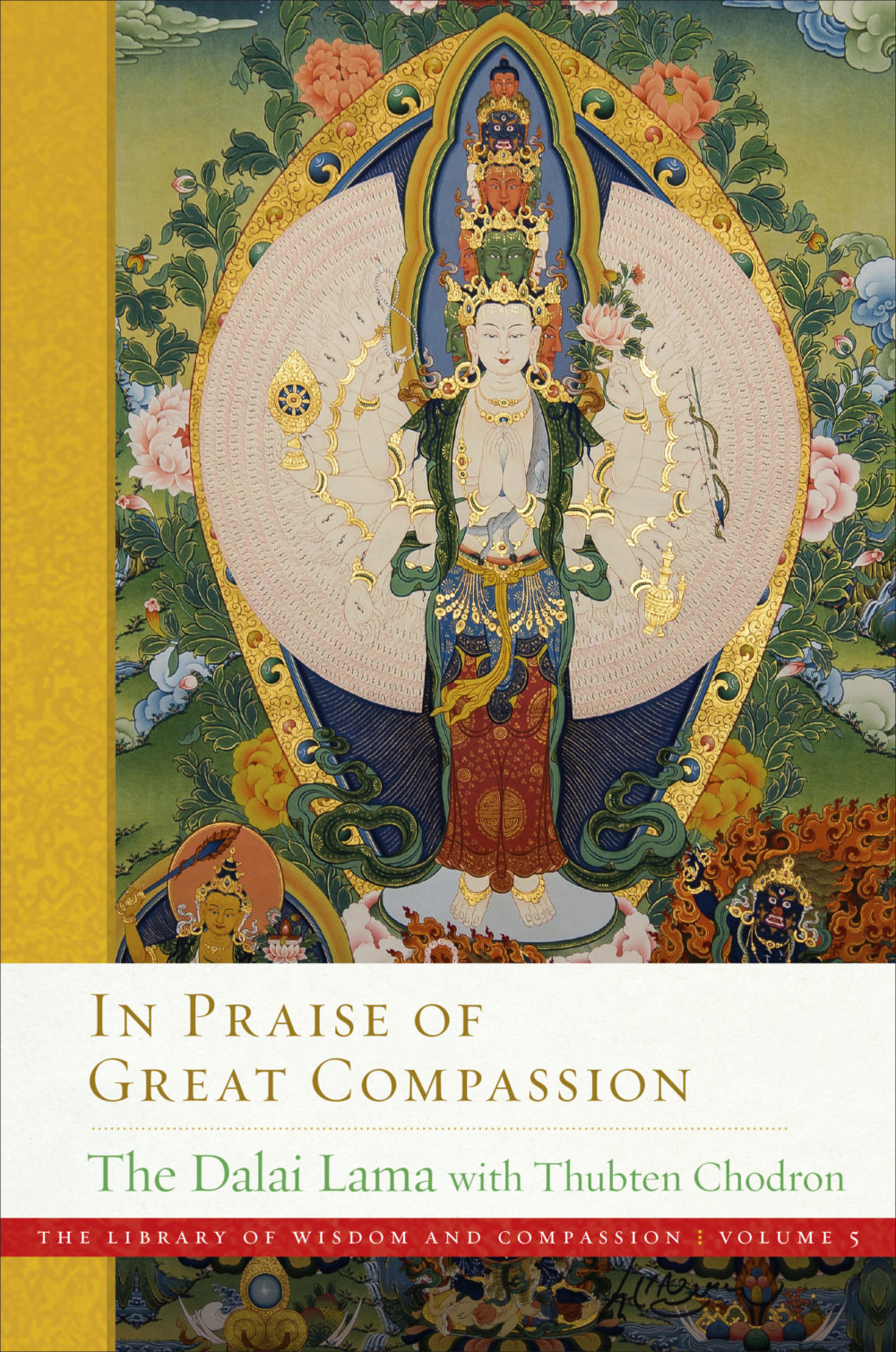 In Praise of Great Compassion continues the Dalai Lama’s teachings on the path to awakening. While previous volumes focused on our present situation and taking responsibility for creating the causes of happiness, this volume concerns opening our hearts and generating the intention to make our lives meaningful by benefiting others. We are embedded in a universe with other living beings, all of whom have been kind to us in one way or another. More than any other time in human history, we depend on one another to stay alive and flourish. When we look closely, it becomes apparent that we have been the recipient of great kindness. Wanting to repay others’ kindness, we cultivate a positive attitude by contemplating the four immeasurables of love, compassion, empathic joy, and equanimity, and the altruistic intention of bodhicitta. We learn to challenge the self-centered attitude that leads to misery and replace it with a more realistic perspective enabling us to remain emotionally balanced in good and bad times. In this way, all circumstances become favorable to the path to awakening.
In Praise of Great Compassion continues the Dalai Lama’s teachings on the path to awakening. While previous volumes focused on our present situation and taking responsibility for creating the causes of happiness, this volume concerns opening our hearts and generating the intention to make our lives meaningful by benefiting others. We are embedded in a universe with other living beings, all of whom have been kind to us in one way or another. More than any other time in human history, we depend on one another to stay alive and flourish. When we look closely, it becomes apparent that we have been the recipient of great kindness. Wanting to repay others’ kindness, we cultivate a positive attitude by contemplating the four immeasurables of love, compassion, empathic joy, and equanimity, and the altruistic intention of bodhicitta. We learn to challenge the self-centered attitude that leads to misery and replace it with a more realistic perspective enabling us to remain emotionally balanced in good and bad times. In this way, all circumstances become favorable to the path to awakening.
Volume 6: Courageous Compassion
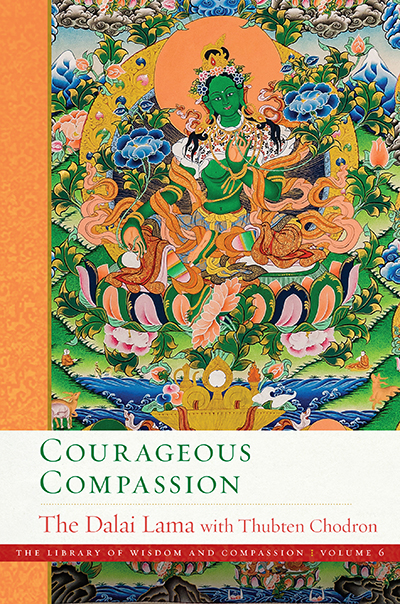 Courageous Compassion, the sixth volume of the Library of Wisdom and Compassion, continues the Dalai Lama’s teachings on the path to awakening. The previous volume, In Praise of Great Compassion, focused on opening our hearts with love and compassion for all living beings, and the present volume explains how to embody compassion and wisdom in our daily lives. Here we enter a fascinating exploration of bodhisattvas’ activities across multiple Buddhist traditions—Tibetan, Theravāda, and Chinese Buddhism.
Courageous Compassion, the sixth volume of the Library of Wisdom and Compassion, continues the Dalai Lama’s teachings on the path to awakening. The previous volume, In Praise of Great Compassion, focused on opening our hearts with love and compassion for all living beings, and the present volume explains how to embody compassion and wisdom in our daily lives. Here we enter a fascinating exploration of bodhisattvas’ activities across multiple Buddhist traditions—Tibetan, Theravāda, and Chinese Buddhism.
After explaining the ten perfections according to the Pāli and Sanskrit traditions, the Dalai Lama presents the sophisticated schema of the four paths and fruits for śrāvakas and solitary realizers and the five paths for bodhisattvas. Learning about the practices mastered by these exalted practitioners inspires us with knowledge of our minds’ potential. His Holiness also describes buddha bodies, what buddhas perceive, and buddhas’ awakening activities.
Courageous Compassion offers an in-depth look at bodhicitta, arhatship, and buddhahood that you can continuously refer to as you progress on the path to full awakening.
Volume 7: Searching for the Self
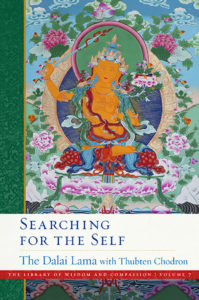 In Searching for the Self the Dalai Lama leads us to delve deeply into the topic of the emptiness of inherent existence, presenting it from a variety of approaches while focusing on identifying our erroneous views and directing us to the actual mode of existence of all persons and phenomena.
In Searching for the Self the Dalai Lama leads us to delve deeply into the topic of the emptiness of inherent existence, presenting it from a variety of approaches while focusing on identifying our erroneous views and directing us to the actual mode of existence of all persons and phenomena.
Placing our study of reality within the auspicious context of a compassionate motivation to benefit all sentient beings, the Dalai Lama explains why realizing emptiness is important and what qualities are needed to do that, and he evaluates various tenet systems’ perspectives on this vast topic. He then helps us understand our perceptions and the mental states involved in both our ignorant and accurate cognitions. He examines inherent existence and other fantasized ways of existence that we seek to disprove through reasoned analysis and presents the Middle Way view that abandons all extremes. The closing chapters by Thubten Chodron discuss the three characteristics of impermanence, unsatisfactoriness, and not-self as explained in the Pāli tradition and show how meditation on these can lead to the meditative breakthrough to realize nirvāṇa.
Engaging in this investigation with His Holiness will challenge our deepest-held beliefs and uproot false ways of viewing ourselves and the world that are so habitual we don’t even notice them. Get ready to be challenged and intrigued, for realizing the nature of reality has the power to cut our defilements at the root and free us from cyclic existence forever!
Volume 8: Realizing the Profound View
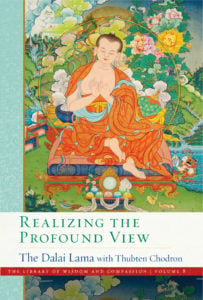 In Realizing the Profound View the Dalai Lama presents the analysis and meditations necessary to realize the ultimate nature of reality.
In Realizing the Profound View the Dalai Lama presents the analysis and meditations necessary to realize the ultimate nature of reality.
With attention to Nāgārjuna’s five-point analysis, Candrakīrti’s seven-point examination, and Pāli suttas, the Dalai Lama leads us to investigate who or what is the person. Are we our body? Our mind? If we are not inherently either of them, how do we exist, and what carries the karma from one life to the next? As we explore these and other fascinating questions, he skillfully guides us along the path avoiding the chasms of absolutism and nihilism and introduces us to dependent arising. We find that although all persons and phenomena lack an inherent essence, they do exist dependently. This nominally imputed mere I carries the karmic seeds. We discover that all phenomena exist by being merely designated by term and concept—they appear as like illusions, unfindable under ultimate analysis but functioning on the conventional level. Furthermore, we come to understand that emptiness dawns as the meaning of dependent arising, and dependent arising dawns as the meaning of emptiness. The ability to posit subtle dependent arisings in the face of realizing emptiness and to establish ultimate and conventional truths as noncontradictory brings us to the culmination of the correct view.
The second of three volumes on the nature of reality in the Library of Wisdom and Compassion series, Realizing the Profound View challenges the ways we view the self and the world, bringing us that much closer to liberation.
Volume 9: Appearing and Empty
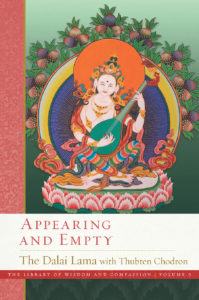 In Appearing and Empty the Dalai Lama skillfully reveals the Prāsaṅgikas’ view of the ultimate nature of reality so that we will gain the correct view of emptiness, the selflessness of both persons and phenomena, and have the means to eliminate our own and others’ duḥkha. In this last of three volumes on emptiness, the Dalai Lama takes us through the Sautrāntika, Yogācāra, and Svātantrika views on the ultimate nature of reality and the Prāsaṅgikas’ thorough responses to these, so that we gain the correct view of emptiness—the selflessness of both persons and phenomena.
In Appearing and Empty the Dalai Lama skillfully reveals the Prāsaṅgikas’ view of the ultimate nature of reality so that we will gain the correct view of emptiness, the selflessness of both persons and phenomena, and have the means to eliminate our own and others’ duḥkha. In this last of three volumes on emptiness, the Dalai Lama takes us through the Sautrāntika, Yogācāra, and Svātantrika views on the ultimate nature of reality and the Prāsaṅgikas’ thorough responses to these, so that we gain the correct view of emptiness—the selflessness of both persons and phenomena.

